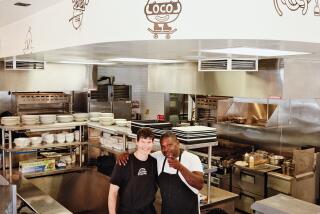Watts Store Owner Who Stood Up to Gang Eulogized for Kindness
The Slater Market in Watts was closed Tuesday, and the small yellow stucco house behind it was unusually quiet. The owner of the two, a man who became a local celebrity for standing up to a neighborhood gang, was being buried.
As several limousines and a motorcycle escort from the funeral procession for James Henry Hawkins Sr. slowly passed the market on Imperial Highway at Slater Street, Rick Scoggins watched while eating a hamburger outside a neighboring fast-food stand.
“Sure I knew him. Everybody knows everybody around here,” said the Carson resident, who used to deliver mail in the area. “That man stood for right in the community.”
Visible in the limousines were several of Hawkins’ 14 children and his 74-year-old wife, Elsie, who had just come from an hourlong funeral service attended by more than 250 people at the Angelus Chapel in the Crenshaw District. Burial was at Lincoln Memorial Park in Carson.
Hawkins, who died Thursday of cancer, was eulogized by two of his many grandchildren and by his son, Elton, 40. Elton spent more time recalling the many kindnesses of his 80-year-old father than the incidents that made him famous.
In 1983, Hawkins became the target of a local street gang after he foiled an attempted holdup in his grocery store and hamburger stand. Later that year, Hawkins and his son, James Jr., stopped alleged gang members from accosting a woman and her children near the family store, and his son shot and killed one of the youths.
The elder Hawkins told reporters he was relying on “guns, grit and God” to stay in Watts and vowed that the “only way they are going to get me to leave is in a pine box.”
The situation was resolved after police began guarding Hawkins and his store. But it resulted in family tragedy when James Hawkins Jr. was convicted of voluntary manslaughter in the death of the youth. He later was sentenced to life in prison for two unrelated murders.
The elder Hawkins, as he had vowed, stayed in the community, where the streets are filled with litter and weeds, and where many of the city’s poorest citizens live in the Nickerson Gardens housing project, across the street from the market.
“He didn’t care what race you were, what religion you were, he was willing to give you the shirt off his back,” his granddaughter, Elsie Dorsey, told the congregation.
Dorsey noted that Hawkins had come to Los Angeles from the South in 1942, riding a mule, and started what became the city’s first successful black-run mortuary. The mortuary is no longer in business. But the motorized escort service for funeral processions Hawkins started is still run by his sons.
Others told of how Hawkins gave out free turkeys and hams during the holidays.
“He brought the community together around his store,” his son Otis said. “He brought closeness and love.”
Later, as Scoggins watched the limousines pass, he said, “Even though he had the financial means to leave the community, he never did. He was for the development of black people, and he tried to help them.
“He’s going to be greatly missed.”
More to Read
Sign up for Essential California
The most important California stories and recommendations in your inbox every morning.
You may occasionally receive promotional content from the Los Angeles Times.










